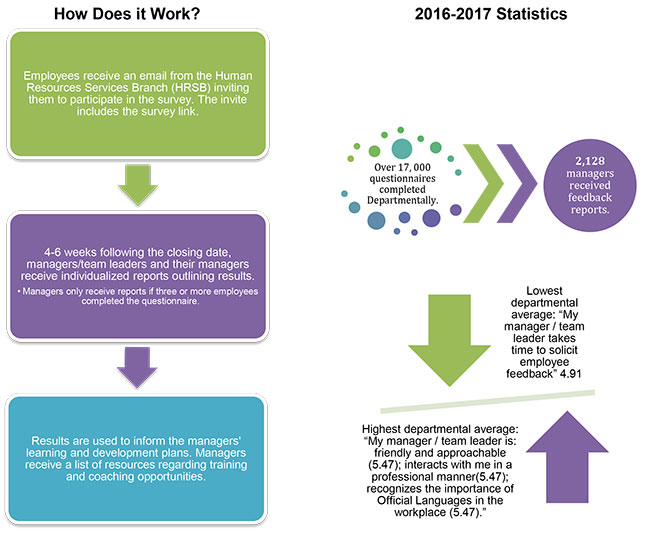The Employee to Manager Feedback Questionnaire (EMFQ)
| What is the Employee to Manager Feedback Questionnaire (EMFQ)? |
An annual Departmental online questionnaire that allows employees to provide feedback to their manager/team leader on their leadership skills. |
|---|---|
|
The questionnaire consists of 25 questions and takes only a few minutes to complete. |
|
|
Employee participation is voluntary and answers are confidential. |
| Why Participate? |
It is a unique opportunity for employees to give honest and constructive feedback to their manager. |
|---|---|
|
Results provide managers with key insights as to where their employees think they excel as a leader, and areas for improvement. |
|
|
Employee feedback is an important source of information for managers when planning informal and formal leadership development. |
|
|
Managers are expected to discuss results with employees to validate their understanding and develop strategies to address areas for improvement. |

Image Description:
How Does it Work?
- Employees receive an email from the Human Resources Services Branch (HRSB) inviting them to participate in the survey. The invite includes the survey link.
- 4-6 weeks following the closing date, managers/team leaders and their managers receive individualized reports outlining results. Managers only receive reports if three or more employees completed the questionnaire.
- Results are used to inform the managers' learning and development plans. Managers receive a list of resources regarding training and coaching opportunities.
2016-2017 Statistics
- Over 17, 000 questionnaires completed Departmentally.
- 2,128 managers received feedback reports.
- Lowest departmental average: "My manager / team leader takes time to solicit employee feedback" 4.91
- Highest departmental average: "My manager / team leader is: friendly and approachable (5.47); interacts with me in a professional manner(5.47); recognizes the importance of Official Languages in the workplace (5.47)."